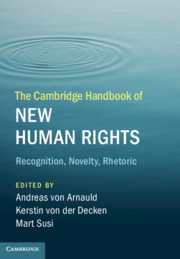Book contents
- The Cambridge Handbook of New Human Rights
- The Cambridge Handbook of New Human Rights
- Copyright page
- Contents
- Figures
- Contributors
- Acknowledgements
- Introduction
- Part I Cross-Cutting Observations
- Part II Public Good Rights
- Part III Status Rights
- Part IV New Technology Rights
- Part V Autonomy and Integrity Rights
- The Right to Bodily Integrity
- The Right to Mental Integrity
- 30 The Nascent Right to Psychological Integrity and Mental Self-Determination
- 31 Critical Reflections on the Need for a Right to Mental Self-Determination
- Rights Relating to Enforced Disappearance
- The Right to Diplomatic and Consular Protection
- Part VI Governance Rights
- Index
30 - The Nascent Right to Psychological Integrity and Mental Self-Determination
from The Right to Mental Integrity
Published online by Cambridge University Press: 04 January 2020
- The Cambridge Handbook of New Human Rights
- The Cambridge Handbook of New Human Rights
- Copyright page
- Contents
- Figures
- Contributors
- Acknowledgements
- Introduction
- Part I Cross-Cutting Observations
- Part II Public Good Rights
- Part III Status Rights
- Part IV New Technology Rights
- Part V Autonomy and Integrity Rights
- The Right to Bodily Integrity
- The Right to Mental Integrity
- 30 The Nascent Right to Psychological Integrity and Mental Self-Determination
- 31 Critical Reflections on the Need for a Right to Mental Self-Determination
- Rights Relating to Enforced Disappearance
- The Right to Diplomatic and Consular Protection
- Part VI Governance Rights
- Index
Summary
This chapter presents the case for recognising a slowly emerging human right that protects the human mind, the right to psychological or mental self-determination, along with some suggestions for a plausible construal. The human mind is an entity poorly protected by law and poorly understood by science: what it truly is, what it consists and what it is made of, the laws and dynamics by which it operates, and how it relates to the brain as its material substrate are among the last mysteries of science and metaphysics. People, however, are intimately familiar with many facets of their minds from personal experience, and they constantly interact with minds of others. In light of Descartes’ famous proposition cogito ergo sum, a thinking mind might well be the essence of being human. For legal purposes, a rough definition of the mind may suffice: it comprises all conscious and non-conscious mental states, events and processes, i.e. thoughts and beliefs, emotions and moods, as well as the underlying psychological mechanisms operating in the complex mental machinery.
- Type
- Chapter
- Information
- The Cambridge Handbook of New Human RightsRecognition, Novelty, Rhetoric, pp. 387 - 403Publisher: Cambridge University PressPrint publication year: 2020
- 16
- Cited by

